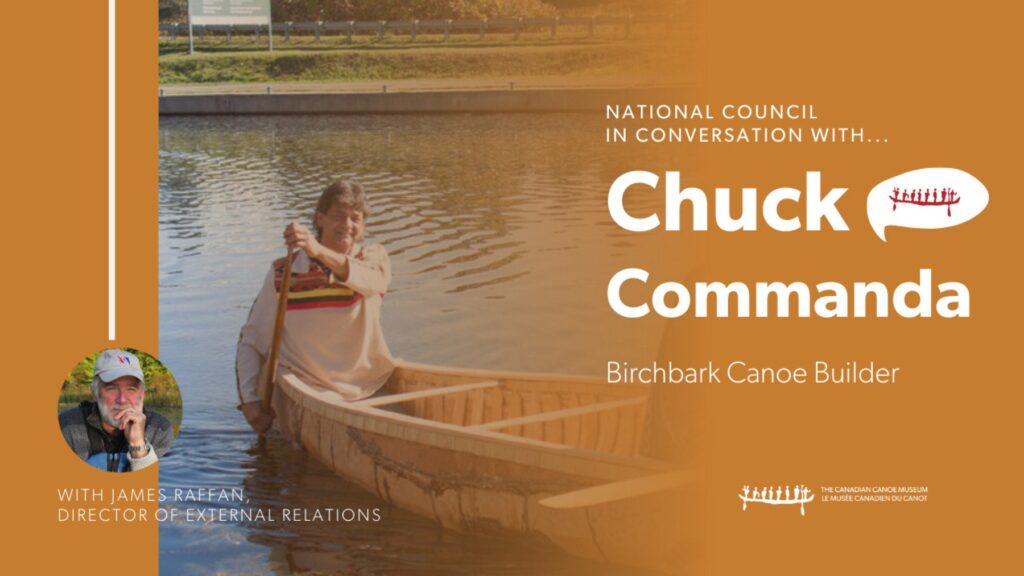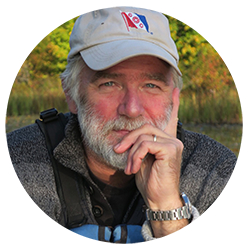
Chuck Commanda was doing just fine making birch baskets. In fact, word of his skill spread to the National Museum of the American Indian in Washington, D.C. where he was invited to give workshops and presentations to thousands of people interested in Anishinaabe traditional crafts. Life was good. But then back around the year 2008, his grandfather, William Commanda, asked if Chuck might be interested in doing what he had done with his grandparents as a boy, back in his home community of Kitigan Zibi, north of Ottawa, and make a birchbark canoe. That was the beginning of something of a life transformation for the Canadian Canoe Museum National Councillor.
“What I’m doing, I’m doing for the benefit of the people as a whole.”
Chuck Commanda
This past November, as the pandemic raged on, Chuck donned his mask, brushed up on his COVID protocols and headed up to the curling rink in Chapleau, Ontario where he completed what he thinks might have been his fiftieth community-built bark canoe since 2008. He’d been in Chapleau in the summer, sourcing bark in the woods surrounding the three First Nations in the Chapleau area, and teaching some of the community leaders who would help with the build, how to get the right spruce root and clear cedar, so that everything would be ready for the build when it happened later in the fall. By the time the build did happen, everything went perfectly, except that the waters around Chapleau were frozen. So instead of paddling the canoe to test its seaworthiness, they had to fill it with water indoors to check for leaks!
That’s just a couple of the wonderful stories contained in a new online feature from the Canadian Canoe Museum that draws on the passions and expertise of the member of our National Council. In part compelled by the pandemic and the need to go digital to avoid transmission of the COVID-19 virus, and in part driven by the certain knowledge that one of the main reasons to build a group of luminous Canadians to advise and guide the museum is to bring their knowledge and wisdom into the museum’s orbit, the museum’s past Executive Director and now Director of External Relations, James Raffan, has added ‘Zooming’ to the ways that he’s connecting with members of the National Council. These are the conversations that make up this new series called “National Council in Conversation.”
Up first is Anishinaabe Traditional Knowledge Holder and über bark canoe builder, Chuck Commanda. You can check out Episode 1 of National Council in Conversation here:
Content Warning: References to residential schools, suicide, and substance use.
Referenced in this episode:
- Radio: q with Tom Power: How Rebecca Thomas’s debut poetry collection serves as a rallying cry for Indigenous justice
- Book: Birchbark Canoe: Living Among the Algonquins by David Gidmark
- Connected by Canoe documentary

James Raffan
James has been a part of the museum since its inception, having held a number of roles including, most recently, the Director of Development and Director Emeritus. He served as the Executive Director from 2008 to 2014, the Curator in 2007, and worked on the first education program in 1999. This work stemmed from his volunteer involvement on the museum’s Education Advisory Committee in the 1990s, which he undertook as a professor at Queen’s University in the Faculty of Education. He held a number of positions with Queen’s from 1982 to 1999 and is also a graduate of the University. James holds a Doctor of Philosophy, Master of Education, Bachelor of Education and Bachelor of Science. He is a celebrated author of numerous books including, Ice Walker: A Polar Bear’s Journey Through the Fragile Arctic, Circling the Midnight Sun: Culture and Change in the invisible Arctic, and the national bestsellers Emperor of the North: Sir George Simpson and the Remarkable Story of the Hudson’s Bay Company and Deep Waters: Courage, Character and the Canoeing Tragedy of Lake Timiskaming. James has been honoured with numerous recognitions and awards, including the Meritorious Service Medal from the Governor General of Canada, Honourary Doctor of Laws from the University of Guelph, and a number of others related to his considerable work as a writer and outdoorsman. Years spent as a camper and staff member at Camp Kandalore from 1959 to 1973 inspired James’ lifelong interest in the collection.






